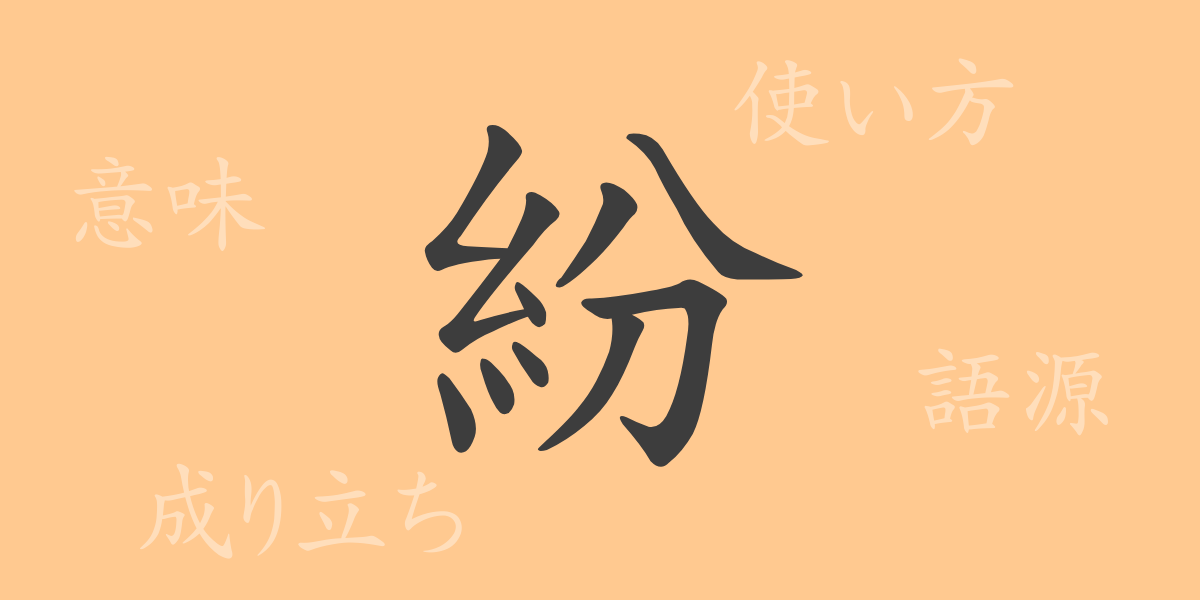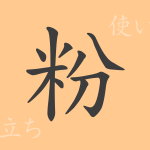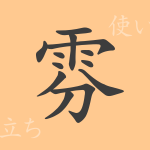The depth of meaning carried by a single kanji character beautifully encapsulates the charm of the Japanese language. One such character frequently used in daily life is the 常用漢字 (jōyō kanji) “紛 (fun)”. In this article, we delve into the origins, meanings, usages, readings, and expressions involving “紛 (fun)” to uncover its allure.
The Origins of 紛 (fun)
The kanji “紛 (fun)” is believed to have originated from the image of threads becoming entangled while spinning. From the entanglement of threads, it came to represent the state of confusion. This character is a combination of the “糸 (ito)” radical, meaning “thread,” and “分 (bun),” which means to divide or distinguish. Thus, “紛 (fun)” signifies a state where threads are entangled and indistinguishable.
The Meaning and Usage of 紛 (fun)
“紛 (fun)” signifies “confusion” or “indistinguishability,” often referring to a mix of similar things. Additionally, it is used in contexts involving conflict or disputes, as seen in words like 紛争 (funsō) and 紛糾 (funkyū). In everyday conversation and writing, it appears in forms such as 紛れる (magireru), 紛らわしい (magirawashii), and 紛失 (funshitsu).
The Readings, Stroke Count, and Radical of 紛 (fun)
The kanji “紛 (fun)” conveys a wealth of information through its form and meaning.
- Readings: In 音読み (on’yomi), it is read as “フン (fun),” and in 訓読み (kun’yomi), it is read as “まぎ.れる (magi.reru),” “まぎ.らす (magi.rasu),” “まぎ.らわす (magi.rawasu),” and “まぎ.らわしい (magi.rawashii).”
- Stroke Count: “紛 (fun)” has a total of 11 strokes.
- Radical: The radical is “糸 (ito)” (thread).
Idioms, Proverbs, and Phrases Using 紛 (fun)
There are numerous idioms, proverbs, and phrases that include “紛 (fun),” each imbued with its unique meaning. Here are a few examples:
- 紛争 (funsō): A conflict between opposing parties.
- 紛糾 (funkyū): A state where matters are intricately entangled and difficult to resolve.
- 紛失 (funshitsu): The act of losing something important.
- 紛れもない (magiremonai): Undoubtedly true.
- 紛らわしい (magirawashii): Easily mistaken for something else.
Conclusion on 紛 (fun)
The kanji “紛 (fun)” has the power to depict a state where things are intricately entangled and indistinguishable. Widely used in Japanese expressions, this kanji plays a role in various contexts, from everyday conversations to business settings. Terms like 紛争 (funsō) and 紛糾 (funkyū) frequently appear in news, while expressions like 紛れもない (magiremonai) truth and 紛らわしい (magirawashii) information deeply resonate in our lives. Understanding and appropriately using idioms and phrases containing “紛 (fun)” can enrich one’s expression significantly.

























